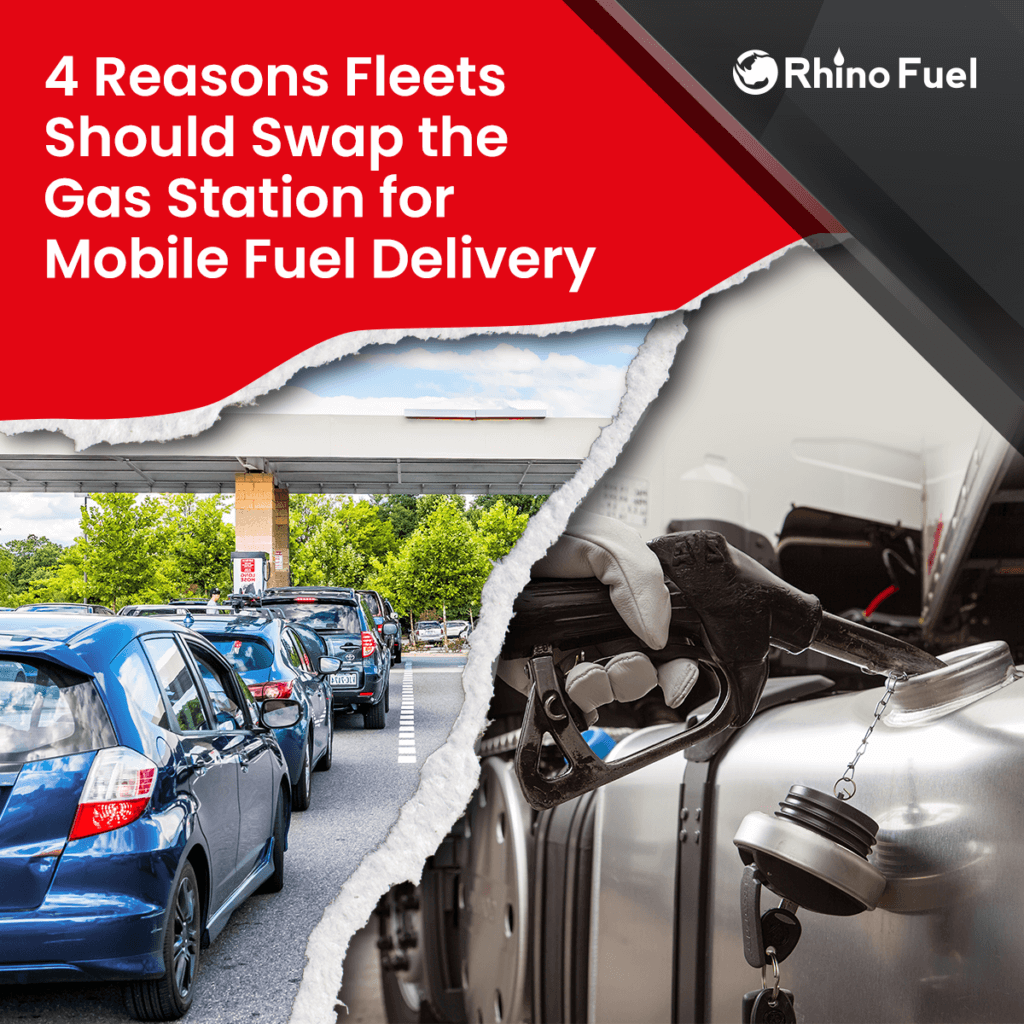Since the first car hit the streets, drivers have been accustomed to making their own trips to the gas station to fuel up. However, the emergence of mobile fuel delivery has revolutionized this routine, offering businesses a highly convenient and flexible way to save time, money and maximize efficiency. This blog will explore four compelling reasons fleets should consider swapping the gas station for mobile fuel delivery.

Cost Savings and Increased Efficiency
From rising maintenance costs to wasted driver time, going to the gas station can drain a fleet's budget and productivity. By switching to mobile fuel delivery, fleets can save significantly and increase their overall efficiency.
Eliminating Unproductive Trips:
Mobile fuel delivery eliminates the need for drivers to make individual trips to gas stations, saving valuable time that can be better spent on their routes. On average, a trip to a gas station takes around 20 minutes. By multiplying that by the number of monthly trips, fleets can quickly see how much time is spent on refueling. Mobile fuel delivery cuts out these unproductive trips, allowing drivers to focus exclusively on their routes and reducing vehicle downtime.
Reduced Vehicle Wear and Tear:
Each trip to the gas station adds extra mileage to fleet vehicles, contributing to increased maintenance costs and depreciation. Fleets can avoid unnecessary mileage using mobile fuel delivery, leading to lower maintenance expenses and prolonged vehicle lifespan. By keeping vehicles on-site for refueling, fleets can minimize wear and tear, resulting in cost savings in the long run.
Environmental Benefits
In addition to cost savings and efficiency gains, mobile fuel delivery offers significant environmental benefits compared to traditional gas stations.
Pollution Reduction:
Gas stations are responsible for significant pollution, including fuel spills and leaks contaminating waterways and public drinking water. Mobile fuel delivery eliminates the risks associated with gas station pollution, ensuring a cleaner and safer environment. Reducing the number of trips to gas stations dramatically reduces the chances of fuel spills and leaks, minimizing the environmental impact.
Lower Carbon Emissions:
Multiple trips to gas stations increase carbon emissions, as each off-route trip releases substantial amounts of carbon dioxide into the atmosphere. Fleets can significantly reduce their carbon footprint by switching to mobile fuel delivery. Centralizing fueling at the fleet yard eliminates emissions from individual trips to gas stations, resulting in a positive environmental impact.
Access to Sustainable Alternative Fuels
As the transportation industry evolves, finding sustainable alternatives to traditional fuels becomes crucial. Mobile fuel delivery can help fleets access and utilize sustainable alternative fuels.
Limited Availability at Gas Stations:
Gas stations have been slow to adopt alternative fuels, with less than five percent of stations in the United States offering them as of January 2023. This limited availability hinders fleets from adopting cleaner fuel options. However, by utilizing mobile fuel delivery, fleets can bypass the limitations of gas stations and gain access to sustainable alternative fuels such as biodiesel and compressed natural gas.
Decarbonizing Fleets:
Sustainable alternative fuels from renewable feedstocks allow fleets to reduce carbon intensity and contribute to decarbonization efforts. Mobile fuel delivery enables fleets to embrace these cleaner fuel options, driving sustainability and efficiency simultaneously. By switching to sustainable alternative fuels, fleets can align their operations with environmental goals and play a role in creating a greener future.
Enhanced Safety and Security
Minimized Fuel Theft and Fraud:
Mobile fuel delivery provides an added layer of security for fleets by reducing the risk of fuel theft and fraudulent activity. With on-site fueling at the fleet yard, the liability for fuel management falls on the fuel provider, mitigating the potential for unauthorized access and fuel siphoning. This ensures that fleets receive the exact amount of fuel they require without worrying about fuel loss due to theft or fraudulent activities at gas stations.
Improved Safety Standards:
Gas stations can sometimes be crowded and chaotic, leading to potential safety hazards for drivers and fleet vehicles. By opting for mobile fuel delivery, fleets can minimize the risks of navigating through busy gas stations, such as accidents, slips, and falls. With fuel delivered directly to the fleet yard, drivers can refuel in a controlled and secure environment, reducing the likelihood of accidents and ensuring the safety of personnel and assets.
By considering the enhanced safety and security benefits of mobile fuel delivery, fleets can streamline their operations and prioritize the well-being of their drivers and assets.
Conclusion:
Mobile fuel delivery is a game-changer for fleets seeking efficiency, cost savings, and environmental sustainability. By swapping the gas station for on-site fleet refueling, businesses can save time, streamline operations, reduce costs, and positively impact the environment. Take the first step toward a more efficient fleet by calling us today!


